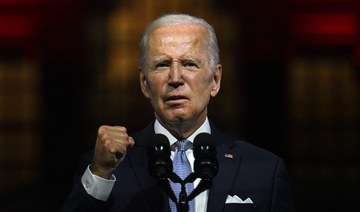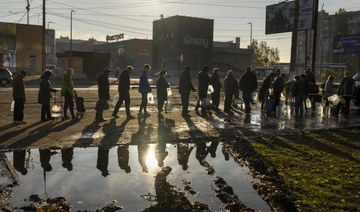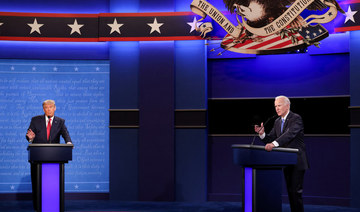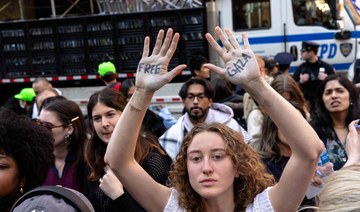KYIV: Refugees who fled in the wake of Russia’s invasion of Ukraine should stay abroad this winter due to blackouts created by Moscow’s bombardment of critical energy infrastructure, a Ukrainian minister has said.
In an interview broadcast on Ukrainian national television on Tuesday, Deputy Prime Minister Iryna Vereshchuk told Ukrainians currently sheltering abroad that they should wait until spring before returning to Ukraine.
“I wanted to ask (them) not to return. We need to survive the winter,” she said.
Since Oct. 10, Russia has launched waves of missile and drone strikes targeting Ukraine’s energy infrastructure. Kyiv says they have damaged up to 40 percent of the power system.
A local official in Kyiv, the capital, warned last week that residents needed to be prepared for possible disconnections lasting days or even weeks.
The strikes on Ukraine’s infrastructure come against a backdrop of soaring energy, food and other prices in Europe, where most of the millions of refugees who fled Ukraine following Russia’s Feb. 24 invasion sought shelter.
This poses a problem for refugees, many of whom have struggled to find well-paid, permanent jobs in their new countries of residence.
Vereshchuk said the grid “won’t survive” the return of refugees from abroad, and that the situation would “only get worse.”
“To return now is to risk yourself and your children, your vulnerable relatives,” she said.
Ukraine urges refugees to stay abroad as winter power cuts loom
https://arab.news/mdes7
Ukraine urges refugees to stay abroad as winter power cuts loom
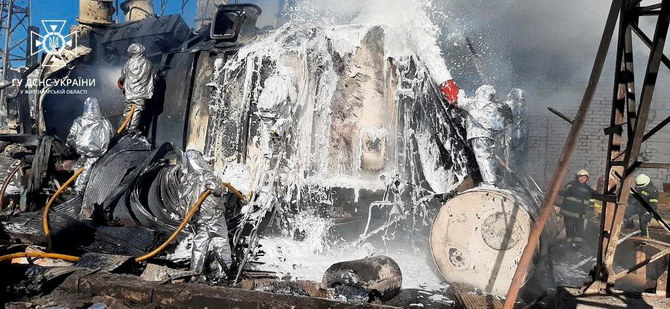
- Deputy Prime Minister Iryna Vereshchuk told Ukrainians currently sheltering abroad that they should wait until spring before returning to Ukraine
Biden and Trump offer worlds-apart contrasts on issues in 2024’s rare contest between two presidents
Biden and Trump offer worlds-apart contrasts on issues in 2024’s rare contest between two presidents

- Their track records and plans leave no doubt that the man voters choose in November will seek to shape the landscape of American life in ways wholly distinct from the other
WASHINGTON: Joe Biden and Donald Trump are two presidents with unfinished business and an itch to get it done.
Their track records and plans on abortion, immigration, taxes, wars abroad — you name it — leave no doubt that the man voters choose in November will seek to shape the landscape of American life in ways wholly distinct from the other.
The choices, if the winner gets his way, are sharply defined. The onward march of regulation and incentives to restrain climate change, or a slow walk if not an about-face. Higher taxes on the super rich, or not. Abortion rights reaffirmed, or left to states to restrict or allow as each decides. Another attempt to legislate border security and orderly entry into the country, or massive deportations. A commitment to stand with Ukraine or let go.
At no time in living memory have two presidents, current and former, competed for the office. Not since Presidents Teddy Roosevelt and William Howard Taft, both Republicans, in 1912, and that didn’t work out for either of them — Democrat Woodrow Wilson won that three-way race.
More than a century later, voters again get to judge two presidents on their records alongside their promises for the next four years. Here’s where they stand on 10 of the top issues:
Abortion
BIDEN: The president has called for Congress to send him legislation that would codify in federal law the right to an abortion, which stood for nearly 50 years before being overturned by the Supreme Court. He has also criticized statewide bans on abortion in Republican states and says he will veto any potential nationwide ban should one come to his desk. In the absence of legislation, his administration has taken narrower actions, such as proposals that would protect women who travel to obtain abortions and limit how law enforcement collects medical records.
TRUMP: The former president often brags about appointing the Supreme Court justices who overturned Roe v. Wade, ending the constitutional right to an abortion. After dodging questions about when in pregnancy he believes the procedure should be restricted, Trump announced in April that decisions on access and cutoffs should be left to the states. He said he would not sign a national abortion ban into law. But he’s declined to say whether he would try to limit access to the abortion pill mifepristone. He told Time magazine in recent interviews that it should also be left up to states to determine whether to prosecute women for abortions or to monitor their pregnancies.
Climate/Energy
BIDEN: In a second term, Biden could be expected to continue his focus on implementing the climate provisions of his Inflation Reduction Act, which provided nearly $375 billion for things like financial incentives for electric cars and clean energy projects. Biden is also enlisting more than 20,000 young people in a national “Climate Corps,” a Peace Corps-like program to promote conservation through tasks such as weatherizing homes and repairing wetlands. Biden wants to triple the group’s size this decade. Despite all this, it’s unlikely that the US will be on track to meet Biden’s goal of reducing greenhouse gas emissions by half by 2030.
TRUMP: His mantra for one of his top priorities: “DRILL, BABY, DRILL.” Trump, who in the past cast climate change as a “hoax” and harbors a particular disdain for wind power, says it’s his goal for the US to have the cheapest energy and electricity in the world. He’d increase oil drilling on public lands, offer tax breaks to oil, gas and coal producers, speed the approval of natural gas pipelines and roll back the Biden administration’s aggressive efforts to get people to switch to electric cars, which he argues have a place but shouldn’t be forced on consumers. He has also pledged to re-exit the Paris Climate Accords, end wind subsidies and eliminate regulations imposed and proposed by the Biden administration targeting energy-inefficient kinds of lightbulbs, stoves, dishwashers and shower heads.
Democracy/Rule of law
BIDEN: Protecting democracy has been the raison d’etre behind Biden’s decision to run for reelection. In a symbolic nod to the Revolutionary War, Biden delivered his first campaign speech of 2024 near Valley Forge, Pennsylvania, where he spoke of George Washington’s decision to step down as the leader of the Continental Army after American independence was won. During the Jan. 5 speech, Biden said this year’s presidential contest is “all about” whether US democracy will survive and he regularly condemns Trump’s denial that he lost the 2020 general election. Biden has called the Jan. 6, 2021, assault on the Capitol a “day that we nearly lost America — lost it all.”
TRUMP: The former president, who famously refused to accept his loss to Biden in 2020, has not committed to accepting the results this time. “If everything’s honest, I’ll gladly accept the results,” Trump recently told the Milwaukee Journal Sentinel. “If it’s not, you have to fight for the right of the country.” He has said he will pardon the Jan. 6 defendants jailed for assaulting police officers and other crimes during the attack on the Capitol. He vows to overhaul the Justice Department and FBI “from the ground up,” aggrieved by the criminal charges the department has brought against him. He also promises to deploy the National Guard to cities such as Chicago that are struggling with violent crime, and in response to protests, and has also vowed to appoint a special prosecutor to go after Biden.
Federal government
BIDEN: The Biden administration is already taking steps to make it harder for any mass firings of civil servants to occur. In April, the Office of Personnel Management issued a new rule that would ban federal workers from being reclassified as political appointees or other at-will employees, which makes them easier to dismiss. That was in response to Schedule F, a 2020 executive order from Trump that reclassified tens of thousands of federal workers so they could be fired more easily.
TRUMP: The former president vows an overhaul of the federal bureaucracy, which he has long blamed for stymying his first term agenda: “I will totally obliterate the deep state.” He plans to reissue the Schedule F order stripping civil service protections. He’d then move to fire “rogue bureaucrats,” including those who ”weaponized our justice system,” and the “warmongers and America-Last globalists in the Deep State, the Pentagon, the State Department, and the national security industrial complex.” He’s pledged to terminate the Education Department and wants to curtail the independence of regulatory agencies like the Federal Communications Commission.
Immigration
BIDEN: The president continues to advocate for the comprehensive immigration bill he introduced on his first day in office, which would grant an eight-year pathway to citizenship for immigrants in the US without legal status, with a faster track for young immigrants living in the country illegally who were brought here as children. That legislation went nowhere in Congress. This year, the president backed a Senate compromise that included tougher asylum standards and billions more in federal dollars to hire more border agents, immigration judges and asylum officers. That deal collapsed on Capitol Hill due to Trump’s opposition. Biden is currently considering executive action on the border, particularly if the number of illegal crossings increases later this year.
TRUMP: The former president promises to mount the largest domestic deportation in US history — an operation that could include detention camps and the National Guard. He’d bring back policies he put in place during his first term, like the Remain in Mexico program and Title 42, which placed curbs on migrants on public health grounds. And he’d revive and expand the travel ban that originally targeted citizens from seven Muslim-majority countries. After the Oct. 7 Hamas attack on Israel, he pledged new “ideological screening” for immigrants to bar “dangerous lunatics, haters, bigots, and maniacs.” He’d also try to deport people who are in the US legally but harbor “jihadist sympathies.” He’d seek to end birthright citizenship for people born in the US whose parents are both in the country illegally.
Israel/Gaza
BIDEN: The war in Gaza, far more so than other national security considerations, has defined Biden’s foreign policy this year, with significant political implications. He has offered full-throated support for Israel since Hamas militants launched a surprise deadly assault on Oct. 7. But as the death toll in Gaza continues to climb, Biden has faced massive backlash at home. His administration is working to broker a temporary ceasefire that would release some hostages held by Hamas, which would also allow for more humanitarian aid to enter the war-torn region. Biden also calls for a two-state solution, which would have Israel existing alongside an independent Palestinian state.
TRUMP: The former president has expressed support for Israel’s efforts to “destroy” Hamas but he’s also been critical of some of Israel’s tactics. He says the country must finish the job quickly and get back to peace. He has called for more aggressive responses to pro-Palestinian protests at college campuses and applauded police efforts to clear encampments. Trump also proposes to revoke the student visas of those who espouse antisemitic or anti-American views.
LGBTQ Issues
BIDEN: The president and White House officials regularly denounce discrimination and attacks against the LGBTQ community. Shortly after he took office, Biden reversed an executive order from Trump that had largely banned transgender people from military service, and his Education Department completed a rule in April that says Title IX, the 1972 law that was passed to protect women’s rights, also bars discrimination based on sexual orientation or gender identity. The new rule was silent on the issue of transgender athletes.
TRUMP: The former president has pledged to keep transgender women out of women’s sports and says he will ask Congress to pass a bill establishing that “only two genders,” as determined at birth, are recognized by the United States. He promises to “defeat the toxic poison of gender ideology.” As part of his crackdown on gender-affirming care, he would declare that any health care provider that participates in the “chemical or physical mutilation of minor youth” no longer meets federal health and safety standards and won’t get federal money. He’d take similarly punitive steps in schools against any teacher or school official who “suggests to a child that they could be trapped in the wrong body.” Trump would support a national prohibition of hormonal or surgical intervention for transgender minors and bar transgender people from military service.
NATO/Ukraine
BIDEN: The president has spent much of his time rebuilding alliances unraveled by Trump, particularly NATO, a critical bulwark against Russian aggression. Since the onset of Russia’s invasion of Ukraine, Biden has pledged unceasing support to Kyiv and he made an unannounced visit there in February 2023 in a show of solidarity. His administration and Congress have sent tens of billions of dollars in military and other aid to Ukraine. The latest tranche of aid totaled $61 billion in weapons, ammunition and other assistance and is expected to last through this year. Continued US assistance is critical, Biden says, because he argues that Russian leader Vladimir Putin will not stop at invading Ukraine.
TRUMP: The former president has repeatedly taken issue with US aid to Ukraine and says he will continue to “fundamentally reevaluate” the mission and purpose of the NATO alliance if he returns to office. He has claimed, without explanation, that he will be able to end the war before his inauguration by bringing both sides to the negotiating table. (His approach seems to hinge on Ukraine giving up at least some of its Russian-occupied territory in exchange for a ceasefire.) On NATO, he has assailed member nations for years for failing to hit agreed-upon military spending targets. Trump drew alarms this year when he said that, as president, he had warned leaders that he would not only refuse to defend nations that don’t hit those targets, but “would encourage” Russia “to do whatever the hell they want” to countries that are “delinquent.”
Tariffs/trade
BIDEN: This is where Biden and his protectionist tendencies — in a continued appeal to working-class voters — have some similarities with Trump. Biden is calling for a tripling of tariffs on Chinese steel, a move that would shield US producers from cheaper imports. The current tariff rate is 7.5 percent for both steel and aluminum but Biden wants that to go to 25 percent. Biden has also said he opposes the proposed acquisition of US Steel by Japan’s Nippon Steel, because it is “vital for it to remain an American steel company that is domestically owned and operated.”
TRUMP: The former president wants a dramatic expansion of tariffs, proposing a levy of perhaps 10 percent on nearly all imported foreign goods. Penalties would increase if trade partners manipulate their currencies or engage in other unfair trading practices. He would also urge Congress to pass legislation giving the president authority to impose a reciprocal tariff on any country that imposes one on the US Much of his trade agenda has focused on China. Trump has proposed phasing out Chinese imports of essential goods including electronics, steel and pharmaceuticals and wants to ban Chinese companies from owning US infrastructure in sectors such as energy, technology and farmland. Whether higher tariffs come from a Biden administration or a Trump one, they are likely to raise prices for consumers who have already faced higher costs from inflation.
Taxes
BIDEN: In his State of the Union address, Biden proposed raising the corporate tax rate to 28 percent and the corporate minimum tax to 21 percent as a matter of “fundamental fairness” that will bring in more money to invest in Americans. The current corporate rate is 21 percent and the corporate minimum, raised under the Inflation Reduction Act, is at 15 percent for companies making more than $1 billion a year. Biden also wants to require billionaires to pay at least 25 percent of their income in taxes and to restore the child tax credit that was enacted under his 2021 COVID-19 relief package, but has since expired.
TRUMP: The former president has promised to extend the tax cuts he signed into law in 2017 and that are due to sunset at the end of 2025. That package cut the corporate tax rate from 35 percent to 21 percent and roughly doubled the standard deduction and child tax credit.
Togo ruling party wins sweeping majority in legislative poll, final provisional results show
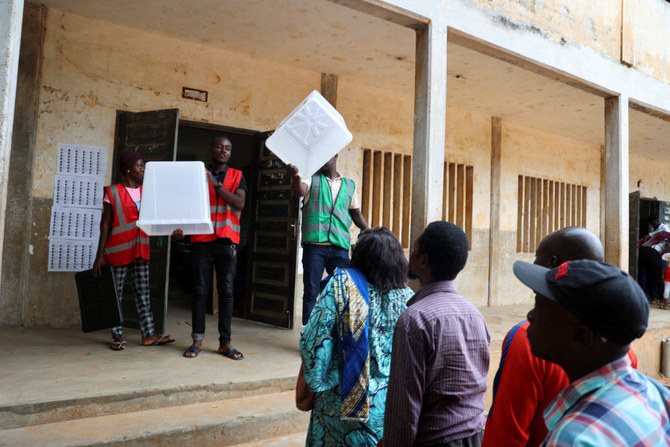
- The UNIR party's victory follows the approval of controversial constitutional reforms that could extend President Gnassingbe's 19-year rule
- Under the new charter, the president will be elected by parliament instead of by universal suffrage
LOME: Togo’s ruling party has won 108 out of 113 seats in parliament, according to the final provisional results of last month’s legislative election announced on Friday.
The sweeping majority secured by President Faure Gnassingbe’s UNIR party follows the approval of controversial constitutional reforms by the outgoing parliament that could extend his 19-year rule.
The new charter adopted in March also introduced a parliamentary system of government, meaning the president will be elected by parliament instead of by universal suffrage.
Opposition parties were hoping to gain seats in the April 29 vote to enable them to challenge the UNIR party after they boycotted the last legislative poll and left it effectively in control of parliament.
The election had been delayed twice because of a backlash from some opposition parties who called the constitutional changes a maneuver to allow Gnassingbe to rule for life.
Constitutional amendments unanimously approved in a second parliamentary vote earlier in April shortened presidential terms to four years from five with a two-term limit.
This does not take into account the time already spent in office, which could enable Gnassingbe to stay in power until 2033 if he is re-elected when his mandate expires in 2025.
Anti-war protest ruffles University of Michigan as demonstrations collide with graduation season

- Israel has killed more than 34,000 Palestinians, according to Gaza’s Health Ministry
- Tent encampments of protesters calling on universities to stop doing business with Israel or companies they say support the war in Gaza have spread across campuses nationwide in recent weeks in a student movement unlike any other this century
NEW YORK: Protesters chanted anti-war messages and waved Palestinian flags during the University of Michigan’s commencement Saturday, as student demonstrations against the Israel-Hamas war collided with the annual pomp-and-circumstance of graduation season at American universities.
The protest happened at the beginning of the event at Michigan Stadium in Ann Arbor. About 75 people, many wearing traditional Arabic keffiyeh along with their graduation caps, marched up the main aisle toward the graduation stage.
They chanted “Regents, regents, you can’t hide! You are funding genocide!” while holding signs, including one that read: “No universities left in Gaza.”
Overhead, planes flew competing messages. One read: “Divest from Israel now! Free Palestine!” The other read: “We stand with Israel. Jewish lives matter.”
Officials said no one was arrested, and the protest didn’t seriously interrupt the nearly two-hour event, which was attended by tens of thousands of people, some of them waving Israeli flags.
State police prevented the demonstrators from reaching the stage and university spokesperson Colleen Mastony said public safety personnel escorted the protesters to the rear of the stadium, where they remained through the conclusion of the event.
“Peaceful protests like this have taken place at U-M commencement ceremonies for decades,” she added.
US Navy Secretary Carlos Del Toro paused a few times during his remarks, saying at one point, “Ladies and gentlemen, if you can please draw your attention back to the podium.”
Before he administered an oath to graduates in the armed forces, Del Toro said they would “protect the freedoms that we so cherish,” including the “right to protest peacefully.”
The university has allowed protesters to set up an encampment on campus but police assisted in breaking up a large gathering at a graduation-related event Friday night, and one person was arrested.
Michigan was among the schools bracing for protests during its commencement ceremonies this weekend, including Indiana University, Ohio State University and Northeastern University in Boston. Many more are slated in the coming weeks.
At Indiana University, protesters were urging supporters to wear their keffiyehs and walk out during remarks by President Pamela Whitten on Saturday evening. The campus in Bloomington, Indiana, has designated a protest zone outside Memorial Stadium, where the ceremony is set to take place.
Tent encampments of protesters calling on universities to stop doing business with Israel or companies they say support the war in Gaza have spread across campuses nationwide in recent weeks in a student movement unlike any other this century. Some schools have reached agreements with the protesters to end the demonstrations and reduce the possibility of disrupting final exams and commencements.
Many encampments have been dismantled and protesters arrested in police crackdowns.
The Associated Press has recorded at least 61 incidents since April 18 where arrests were made at campus protests across the US More than 2,400 people have been arrested on 47 college and university campuses. The figures are based on AP reporting and statements from universities and law enforcement agencies.
At Princeton, in New Jersey, 18 students launched a hunger strike in an effort to push the university to divest from companies tied to Israel.
Senior David Chmielewski, a hunger striker, said in an email Saturday that the latest protest started Friday morning with participants consuming water only.
He said the hunger strike will continue until university administrators meet with students about their demands, which include amnesty from criminal and disciplinary charges for protesters.
Other demonstrators are participating in “solidarity fasts” lasting 24 hours, he said.
Princeton students set up a protest encampment and some held a sit-in at an administrative building this week, leading to about 15 arrests.
Students at other colleges, including Brown and Yale, launched similar hunger strikes earlier this year before the more recent wave of protest encampments.
In other developments Saturday, police broke up a demonstration at the University of Virginia. Campus police called it an “unlawful assembly” in a post on the social platform X.
Footage from WVAW-TV showed police wearing tactical gear removing protesters from an encampment on the Charlottesville campus. Authorities have not said how many people were arrested.
Meanwhile near Boston, students at Tufts University peacefully took down their protest encampment without police intervention Friday night.
Officials with the school in Medford, Massachusetts, said they were pleased with the development, which wasn’t the result of any agreement with protesters. Protest organizers said in a statement that they were “deeply angered and disappointed” that negotiations with the university had failed.
The protests stem from the Israel-Hamas conflict that started on Oct. 7 when Hamas militants attacked southern Israel, killing about 1,200 people, mostly civilians, and taking roughly 250 hostages.
Vowing to destroy Hamas, Israel launched an offensive in Gaza that has killed more than 34,500 Palestinians, around two-thirds of them women and children, according to the Health Ministry in the Hamas-ruled territory. Israeli strikes have devastated the enclave and displaced most of Gaza’s inhabitants.
US blames Rwanda for deadly attack on displaced camp in DR Congo

- DR Congo government spokesman Patrick Muyaya on Friday had also accused “the Rwandan army and its M23 terrorist supporters” of being responsible in a statement on X, the former Twitter
WASHINGTON: The United States has accused Rwanda of involvement in a deadly attack on a camp for displaced people in the eastern Democratic Republic of Congo, a claim dismissed as “absurd” by Kigali on Saturday.
At least nine people were killed in blasts on Friday in the camp on the outskirts of the city of Goma, local sources said.
“The United States strongly condemns the attack (Friday) from Rwanda Defense Forces and M23 positions on the Mugunga camp for internally displaced persons in eastern Democratic Republic of the Congo,” State Department spokesman Matthew Miller said in a statement.
Miller said the United States was “gravely concerned” by the expansion in DR Congo of Rwandan forces and the M23, a mostly Tutsi group that resumed its armed campaign in the vast, long turbulent DR Congo in 2021.
“It is essential that all states respect each other’s sovereignty and territorial integrity and hold accountable all actors for human rights abuses in the conflict in eastern DRC,” he said.
DR Congo government spokesman Patrick Muyaya on Friday had also accused “the Rwandan army and its M23 terrorist supporters” of being responsible in a statement on X, the former Twitter.
Rwandan government spokesperson Yolande Makolo described the US comments as “ridiculous,” in a post on X.
“How do you come to this absurd conclusion? The RDF, a professional army, would never attack an IDP camp,” she said.
“Look to the lawless FDLR and Wazalendo supported by the FARDC (the Congolese armed forces), for this kind of atrocity,” she added.
The FDLR, or Democratic Forces for the Liberation of Rwanda, is an armed ethnic Hutu group operating in Congo’s east for 30 years, while Wazalendo is fighting the M23 alongside the Congolese army.
The origin of Friday’s blasts has not been clearly established.
According to witnesses, government forces positioned near the camp had been bombarding the rebels on hills further west since early morning and, according to a civil society activist, “the M23 retaliated by throwing bombs indiscriminately.”
“Horror in its most serious form! A bomb on civilians, deaths, children! A new war crime,” said the government spokesman Muyaya.
The United States has repeatedly backed Kinshasa’s claims that Rwanda has backed the M23, but Miller’s statement amounts to an unusually direct implication.
France’s President Emmanuel Macron also this week called on Rwanda to end its backing for M23 rebels and withdraw its troops from DR Congo territory.
President Paul Kagame in turn has demanded that the DR Congo act against Hutu forces over ties with the perpetrators of Rwanda’s 1994 genocide, which mostly targeted Tutsis.
The United States has repeatedly sought to mediate between the two sides, with intelligence chief Avril Haines in November visiting DR Congo and Rwanda and announcing a pathway to reduce tensions.
Secretary of State Antony Blinken this year met Kagame and voiced hope that Rwanda was willing to engage in diplomacy.
Netherlands remembers World War Two dead amid tight security due to Gaza war
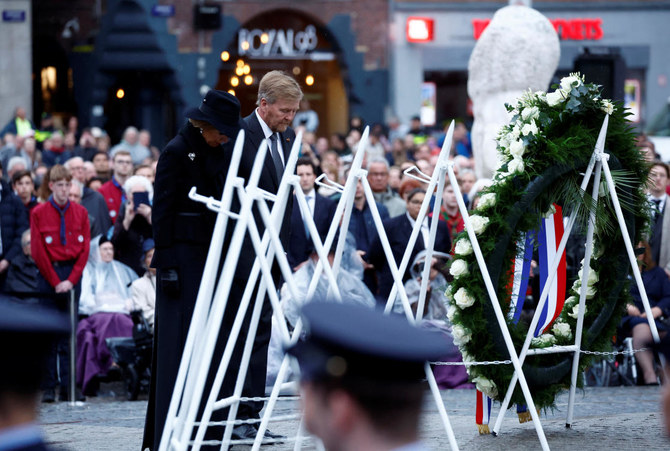
- Normally some 20,000 people attend the Dam commemoration
- Earlier this week municipal authorities announced unprecedented security measures to keep the ceremony safe and avoid possible disruptions linked to the Israel-Hamas war
AMSTERDAM: Dutch King Willem-Alexander and Prime Minister Mark Rutte joined around 4,000 people on Saturday for the country’s annual World War Two remembrance ceremony amid restricted public access and heightened security due to the war in Gaza.
The ceremony on Amsterdam’s central Dam square, with the traditional two minutes of silence at 8 p.m. (1800 GMT) to commemorate the victims of World War Two, passed smoothly despite fears that there might be protests.
Normally some 20,000 people attend the Dam commemoration without having to register. But earlier this week municipal authorities announced unprecedented security measures to keep the ceremony safe and avoid possible disruptions linked to the Israel-Hamas war.
At the opening of a Holocaust Museum in Amsterdam in March, pro-Palestinian protesters opposed to Israel’s military campaign in Gaza set off fireworks and booed Israeli President Isaac Herzog as he arrived on a visit.
Every town and the city in the Netherlands holds its own remembrance ceremony on May 4 and tens of thousands of people attend the events. The Netherlands then marks on May 5 the anniversary of its liberation from Nazi occupation in 1945.



